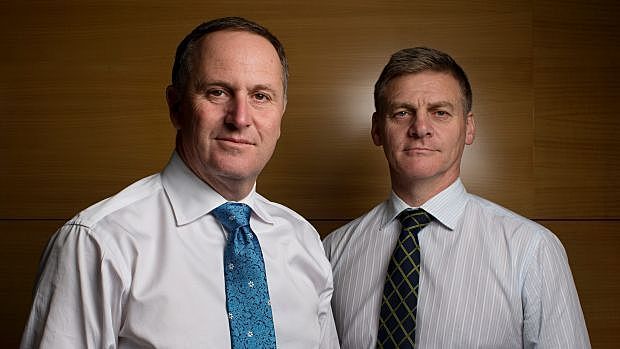Pride and Fear
Ella Grace McPherson Newton on demanding pride from Waitangi Day
Reading between the lines of the Prime Minister's decision not to go to Waitangi today tells us a lot about what Pākehā have come to desire out of their February public holiday. The denial and amnesia is still there and still dangerous, writes Ella Grace McPherson-Newton.
For the second year in a row, the Prime Minister will not be attending Waitangi on February the 6th. In a brief media appearance, Bill English announced that the proceedings weren’t planned to his liking (not allowing him to speak at the powhiri the day before, and therefore not “respectful to New Zealand or New Zealanders”), and that he wants to avoid the annual protests, stating that “Waitangi Day is a day when New Zealanders want to be proud of their country.”
The idea of a ‘day of pride’ for a country that has a child poverty rate of one in four, rising unemployment, homelessness and cost of living may seem like a cruel joke. But when those factors don’t really affect you, it’s understandable that you would like a day to celebrate your wealth, good fortune and fabricated cultural identity.
It doesn’t take too much decoding to get to what Bill’s talking about. It’s the same euphemism most Pākehā Members of Parliament resort to when they say ‘New Zealander’ - that is, Pākehā. When he says “New Zealanders want a day to be proud of their country” what he means is most Pākehā want a day to feel proud. That, in turn means not wanting to be reminded of our history on the one day a year we are collectively reminded of it.
He followed this offhandedly by saying that many people “cringe” at the protests on Waitangi Day. While it would be easy to address the absurdity of ‘cringing’ at civil protest, as opposed to the innumerable inequalities and historic injustices that protest is founded on in the first place, I want to focus on the PM’s choice of language here:
“15 to 20 years ago, protests at Waitangi were nationally relevant, but that time has passed because we’ve made so much progress on relations with Māori and treaty settlements.”[1]
The subtext of this remark - that the ‘we’ is Pākehā, and the ‘they’ is Māori - is the kind of us-and-them rhetoric that flows freely and consistently out of tabloids and the six o’clock news, and carries a further message when coming from English in this instance. Here, the ‘we’ isn’t just Pākehā, it’s government. Power. That is, that ‘we (the colonising and governing body that makes the decisions) have made so much progress that we’ve actually reached to a place where history can be settled for good’.
Across the world, a consistency of the coloniser is an obsession with settling (forgetting) the past. It’s ironic that the way English is talking, he could well be one of those early British officers, settling the bad deals of traders a decade earlier before laying out the survey pegs of the Crown. In this sense he is making the same calls for the end of history that marked the nation-building efforts of his predecessor, normalising wherever possible the dismissal of our history for the idea of ‘progress’. Lawyer and academic Ani Mikaere explains this psychology well;
“Pākehā people carry an enormous burden of guilt about how they have come to occupy their present position of power and privilege. They also have a deep rooted insecurity about the state they have attempted to create on Māori land. Pākehā have developed a range of strategies to deal with these uncomfortable truths. One such strategy is the art of selective amnesia, which reveals itself in an apparent ability to conveniently forget vast chunks of history as and when it suits. Another is denial and distortion of the truth, for example, insisting that colonisation was overwhelmingly a positive experience for Māori. The obsession with looking forward typifies this stance, indicating a desperate fear of being confronted with the consequences of what has been done in the past.”[2]
Many are understandably still confused about what happened at Waitangi due to educational shortcomings on the part of government. The curriculum is inadequate for explaining how the present is truly shaped by the past - to all intents and purposes, it sees the struggles of the 19th century as a closed book. For many colonial regimes, history is relatively easy to co-opt because of centuries of rule and power over its narrative. In Aotearoa, we aren’t even coming up to 200 years of British occupation, we have a very specific document to lay out what went down - and yet people still talk about it as if it is a ‘debate’ with two valid arguments (one of which simply negates it all). Like, we still need placards and informative web videos to explain the fundamental points of how our society was formed - this is not a time of widespread consensus and reconciliation, any more than 15 to 20 years ago was.
It is also understandable that any political party that relies on the vote of people who either benefit financially from this broken agreement, or have a stake in the idea of the ahistoric ‘New Zealander’, would take steps to erase the significance of a day that inevitably reminds people of our history.
A major point which manages still to be ignored, or outright lied about by political leaders, our schools, the media, (and if you are Pākehā probably some of your rellies) is; that the agreement signed by Māori was made particularly to ensure crown control over the large numbers of mostly British immigrants coming in, (many of whom were lawless), and to protect Māori right to self-determination [3]. It is not hard to understand why, nearly two centuries later, many aren’t happy with a land loss rate of over 96%, and a foreign parliamentary system that has assumed total rule over people who signed an agreement to protect against a loss of its own sovereignty in the first place.
It is also understandable that any political party that relies on the vote of people who either benefit financially from this broken agreement, or have a stake in the idea of the ahistoric ‘New Zealander’, would take steps to erase the significance of a day that inevitably reminds people of our history.
If you don’t watch the six o’clock news for whatever reason, it’s easy to forget, firstly, that many people still do. Secondly, it's easy to forget how far mainstream media will go to add to this erasure by sensationalising Waitangi reporting, leaving no room for history or grievance.
The news of the decision by Te Tii Marae to charge for access gave the media easy drama and conflict, an effective way to vilify the Marae and aiding the push away from Waitangi. Reports and articles from journalists that focused on their personal annoyance about the decision painted it as a betrayal to the public, as if for over 30 years they haven’t been going there specifically to demonise Māori protestors as intractable and unreasonable, and highlight each outburst. As if there weren’t subtle grins and high-fives in the newsroom when they got word. Patrick Gower’s well-rehearsed speech on how the marae committee have “wrecked the day before Waitangi for everyone” is one of the most obviously calculated media moments I have witnessed in a long time.
One of the most sinister as well, given how well it showcases what Mikaere describes as "the Pākehā determination to assume the mantle of victimhood". Gower’s disingenuous passion on the issue would be embarrassing to watch if it weren’t for the amount of power he and his colleagues have, and what it represents. That assumed victimhood is something that can be easily unlocked and provoked in Pākehā for groups who wouldn't easily earn sympathy otherwise. The media know it, as do politicians.
Taking the Prime Minister out of the yearly commemoration at Waitangi and making it seem like a marginal or counter-cultural activity is part of a long-term plan. While seemingly small, it’s another move toward ‘settlement’, making it possible to evade history on that one day the Beehive actually has to look it in the eye. It further normalises selective amnesia and keeps Pākehā trapped in this colonial pathology, seized with a desperate fear of confronting the problems with and fragility of the imaginary ‘New Zealander’, of accepting our past. This fear is dangerous. Pandering to it by skipping Waitangi is not the same as easing it.
[1] http://www.stuff.co.nz/national/politics/88723858/pm-bill-english-to-attend-waitangi-day-celebrations-at-aucklands-orakei-marae
[2] Colonising Myths, Māori Realities: He Rukuruku Whakaaro. Ani Mikaere, 2011. P68-69
[3] This is a simplification, used as an umbrella term for what Professor Margaret Mutu explained in her 2013 Robson Lecture at the University of Auckland as ‘that constitutional framework and system of laws that had been observed in this country for many centuries, that is, our mana, tino rangatiratanga and our tikanga.’
Some helpful resources on Waitangi:
Online
The Treaty Resource Centre (see list of extra resources here)
Matike Mai (see list of extra resources here)
Margaret Mutu, Te Tiriti o Waitangi in a Future Constitution: Removing the Shackles of Colonisation
Lost in Translation: Te Tiriti o Waitangi Ep 2
Network Waitangi Whangarei: Treaty of Waitangi Q and A
Ani Mikaere, Seeing Human Rights Through Māori Eyes
Katarina Gray-Sharp & Veronica Tawhai, Always Speaking: The Treaty of Waitangi and Public Policy
Network Waitangi Whangarei, Ngāpuhi Speaks
Tamsin Hanly, A Critical guide for Māori and Pākehā Histories of Aotearoa
Ani Mikaere, Colonising Myths, Māori Realities: He Rukuruku Whakaaro
Cover Photo: Flickr/Charlie Brewer
Elsewhere on Pantograph Punch: artists and writers share what Waitangi Day means to them.

